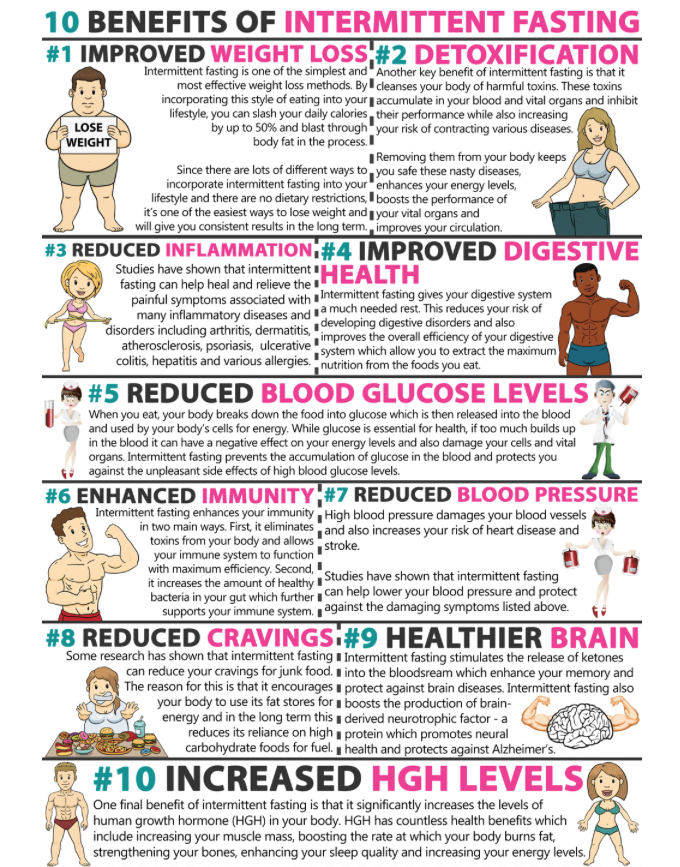Shawn's Weight Loss Journey
Intermittent Fasting - How and why...
Fasting is an ancient practice that involves avoiding calories for a period of time. It is a simple way to control your weight that doesn’t require you to follow a specific diet, count calories or measure food. Combined with Keto or eating salads and other low carb food, Intermittent fasting can be a game changer. As always, please consult with your doctor before you begin any type of lifestyle change such as those being presented here.
There are many ways to practice intermittent fasting for weight loss. The following two are the ones I prefer and have kind of combined them and they also seem to be the most popular. Later on I will post a synopsis of the other types of IF. (Intermittent Fasting)
Time-restricted
eating
This involves consuming all of your meals within a period of 4-12 hours in
a day. For example, you could choose to have your meals and calories between
8 am and 6 pm. Limiting your calorie intake to daylight hours is called “eating
with the sun”. Time-restricted eating is particularly beneficial if
you eat your meals before sunset. Not only does this help you eliminate bad
habits like late-night snacking, but it improves your sleep and blood sugar
control. Over time, time-restricted eating can lower your blood sugar levels,
make you more sensitive to insulin, and reduce your blood pressure.
One-meal-a-day
(OMAD)
This involves packing all of your day’s calories in a single meal that
you consume within 1-2 hours. A small study showed that fasting for 24 hours
3 times a week and eating only dinner on fasting days, eliminated the need
for insulin in type-2 diabetic patients. This fasting approach also resulted
in improved HbA1C, lower body mass index, and reduced waist circumference.
Here are the main health benefits of intermittent fasting...

As you can see, there are a TON of potential benefits, and it really isn't that hard to do. If I can do it, so can you!
Frequently Asked Questions
1.
Can I Drink Liquids During the Fast?
Yes. Water, coffee, tea and other non-caloric or non-carbonated (sugar) beverages
are fine. Do not add sugar to your coffee. Small amounts of milk or cream
may be okay. Coffee
can be particularly beneficial during a fast, as it can blunt hunger.
2.
Isn’t It Unhealthy to Skip Breakfast?
No. The problem is that most stereotypical breakfast skippers have unhealthy
lifestyles. If you make sure to eat healthy food for the rest of the day then
the practice is perfectly healthy. I usually don't care for breakfast typical
food, as I would have a Big Mac or a slice of pizza in the morning...
3.
Can I Take Supplements While Fasting?
Yes. However, keep in mind that some supplements like fat-soluble vitamins
may work better when taken with meals.
4.
Can I Work out While Fasted?
Yes, fasted workouts are fine. Some people recommend taking branched-chain
amino acids (BCAAs) before a fasted workout. Planet Fitness, here I come!
5.
Will Fasting Cause Muscle Loss?
All weight loss methods can cause muscle loss, which is why it’s important
to lift weights and keep your protein intake high. A 2011 study showed that
intermittent fasting causes less muscle loss than regular calorie restriction.
6.
Will Fasting Slow Down My Metabolism?
No. Older studies show that short-term fasts actually boost metabolism. However,
longer fasts of 3 or more days can suppress metabolism, which you don't want
to do. I myself have noticed a increase of energy.
7.
Should Kids Fast?
Allowing your child to fast is probably a bad idea. Intermittent fasting is
not recommended for those in periods of rapid growth, such as children and
adolescents. IF is also not recommended for people, people with a history
of eating disorders, and pregnant or breastfeeding women.
As I promised earlier, here's a breakdown of some other methods of fasting... I personally am doing the time restricted one, but you may use whichever works for you, after all, everyones different!


